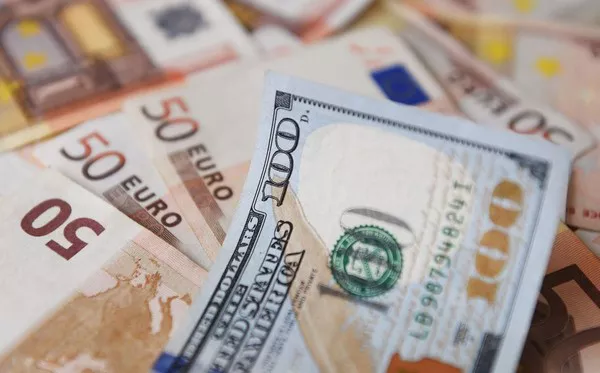Fast-forwarding nearly 80 years we enter what feels like the eye of a digital currency storm. Bitcoin – the most famous and dominant of all cryptocurrencies – has a market cap of $383 billion dollars and is such an actively traded instrument that it’s widely recognized as a legitimate asset class. First mined in 2009, the crypto truly kicked down the doors of the financial world in 2017 – when its price skyrocketed to nearly $20,000 per coin.
Can Bitcoin ever replace the US Dollar?
Four arguments in favor of Bitcoin probably replacing the USD one day
1. Decentralization
Bitcoin is decentralized, meaning it’s not controlled by any government or central authority, thanks to blockchain technology. This type of digital distribution has become so popular, in fact, it’s seeped into industries beyond finance, like health care and real estate.
This combination of decentralization and blockchain technology makes Bitcoin resistant to manipulation and gives it a degree of autonomy that’s not possible with a government-backed currency. For Bitcoin believers, that’s what will pave the way for the coin’s inevitable clash and ultimate overtaking of the US dollar.
2. Limited Supply
Bitcoin’s nature is finite with its limited supply of 21 million coins, which makes it deflationary. Advocates of Bitcoin consider this a major advantage since its value could increase with demand while supply runs low, leading up to an eventual replacement of the USD as a more stable and trustworthy store of value.
Conversely, the USD is an inflationary currency because its central bank – the Federal Reserve – can print more money whenever it deems necessary. Proponents of Bitcoin believe this characteristic will, over time, bring about a decrease in the USD’s value.
3. Global Acceptance
Global adoption has been slow, especially slow on a country level since only El Salvador has so far accepted Bitcoin as legal tender. Even so, those in favor of Bitcoin’s future dominance will argue that big things have small beginnings.
Big brands like Microsoft (NASDAQ:MSFT), Tesla (NASDAQ:TSLA) and Whole Foods have embraced Bitcoin as a legitimate form of payment. As the adoption grows on a commercial level, it could become a more widely used currency, and potentially even replace the USD in some countries.
4. Security
Finally, Bitcoin stalwarts swear by the currency’s advanced cryptographic techniques to secure transactions and protect user privacy. Thanks to blockchain, and the use of a decentralized ledger to immutably record transactions, Bitcoin is more secure than traditional payment methods, which are vulnerable to hacking and fraud.
With greater security and privacy comes greater transparency and accountability, not to mention faster and cheaper cross-border transactions. Together with increased global acceptance, freedom from government coercion, and its deflationary nature, you get a perfect storm that is strong enough to one day displace the mighty US Dollar.
Four arguments against Bitcoin probably replacing the USD one day
1. Volatility
Bitcoin’s value is highly volatile, making it unsuitable as a stable store of value. There are plenty of instances that show how much Bitcoin’s value can either spike – it went from $7,000 to $10,000 in a matter of weeks in December 2019 – or plummet – in May 2021 it had a super sharp drop from $60,000 to $30,000 in a fortnight.
In contrast, the USD is stable and has maintained its value for decades. Investors and speculators may be attracted to Bitcoin, but the average person hates risk. Until it can demonstrate long-term stability, it will never be able to replace the USD.
2. Lack of Regulation
Perhaps the biggest elephant in the room is Bitcoin’s lack of regulation. The March 9 Subcommittee hearing on Digital Assets was so bearish on cryptocurrencies that Bitcoin’s value dropped to a 7-week low. That same day, Gary Gensler, the Chair of the US Securities and Exchange Commission, released a disparaging op-ed on crypto firms that essentially boiled down to “get regulated or die.”
Since Bitcoin operates outside compliance frameworks of most governments, its integrity can always be called into question. And the average consumer will be hard-pressed to use a currency like that.
3. Limited Acceptance and Ease of Use
While supporters cite its growing acceptance, detractors note that Bitcoin is not widely accepted by a vast majority of merchants. They’ll also remind you that the only country that accepted it as legal tender, El Salvador, has a dodgy history of corruption.
This lack of acceptance, combined with the fact that it’s not very straightforward to use when paying for goods and services, does not bode well for Bitcoin’s usefulness as a currency, making it unlikely to replace the USD any time soon.
4. Government Intervention
The biggest takeaway from all the activities on March 9 is that there is still a very dark cloud looming over cryptocurrencies like Bitcoin. While not ignoring blockchain’s transformative potential, the US government is still not ready to embrace cryptos.
While China has outright banned cryptocurrencies, countries like the US, Japan, the UK, and Switzerland have implemented strict regulatory fences around cryptocurrency transactions. If governments were to completely crack down on Bitcoin, the digital currency would be severely handicapped in its efforts to displace the US Dollar.
So, what’s the answer?
Both arguments carry their own weight, so the answer really depends on your personal perceptions and beliefs about Bitcoin and its future potential. It is clearly a disruptor but is it strong enough to replace the world’s primary reserve currency that’s been in place for almost 80 years?
Only time will tell, but one thing is for sure: it will take many, many years for most of the world’s countries and populations to consider Bitcoin as a go-to currency if it stays true to its unregulated and decentralized roots.


